
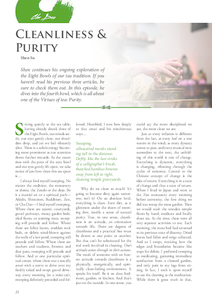 |
|
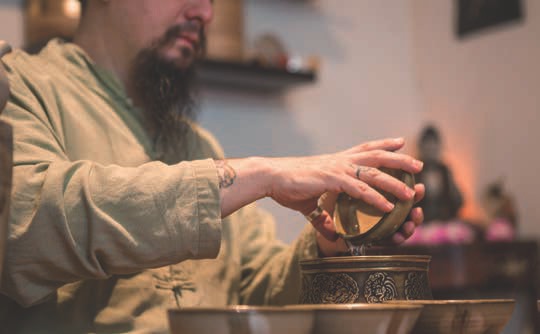
Sitting quietly at the tea table, having already drunk three of the Eight Bowls, our minds settle, our eyes gently close, our shoulders drop, and yet we feel vibrantly alive. There is a subtle energy becoming more prominent as our attention draws further inwards. As the steam rises with the pour of the next bowl and our eyes gently lift open, we take notice of just how clean this tea space is...
I always find myself sweeping. No matter the tradition, the monastery or shrine, the Zendo or the dojo. Be it a martial art or a spiritual path - Aikido, Shintoism, Buddhism, Zen, or Cha Dao - I find myself sweeping. Where there are tatami, courtyards, gravel pathways, mossy garden beds, tiled floors, or training mats, sweeping will precede and follow. Where there are fallen leaves, trodden rock beds, or debris wind-blown against the walls of a koi pond, sweeping will precede and follow. Where there are teachers and students, brooms and dust pans, sweeping will precede and follow. And at one particular spiritual center, where there was a rascally sensei with a nerve to drive over my freshly raked and swept gravel driveway every morning (in a mini-car), sweeping definitely preceded and followed. Humbled, I now bow deeply to that sensei and his mischievous ways...
Sweeping, silhouetted monks standing tall in the distance. Deftly, like the last stroke of a calligrapher's brush, thatched bamboo brooms sway from left to right, cleaning temple graveyards.
Why do we clean so much? It's going to become dirty again tomorrow, isn't it? On an absolute level, everything is clean. Even dirt, as it glimmers under the sheen of morning dew, instills a sense of natural purity. True, in one sense, cleanliness is an attitude, an orientation towards life. There are degrees of cleanliness and a practical line must be drawn at one point or another. But that can't be substituted for the real work involved in cleaning. One's attitude comes through in their actions. The result of someone with an honest attitude towards cleanliness is a physically, energetically, and spiritually clean-feeling environment. It speaks for itself. Be it an altar, bedroom, garden, or kitchen. And that's just on the outside. In one sense, you could say the more disciplined we are, the more clean we are.
Just as every infusion is different from the last, as every leaf on a tree wavers in the wind; as every dynasty comes to pass, and every musical note surrenders to the next, the unfolding of this world is one of change. Everything is dynamic, everything is changing, vibrating through the cycles of existence. Central to the Chinese concept of change is the idea of return. Everything is in a state of change and thus a state of return. When I lived in Japan and went to the Zen monastery every morning before university, the first thing we did was sweep the moss garden. Then we would wash the wooden temple floors by hand, meditate and finally share tea. At the time, these were all very separate activities to me. Each morning, the moss bed had returned to its previous state of disarray. Dried leaves had fallen and twigs collected. And so I swept, noticing how the edges and boundaries became like traps for debris. I preferred sweeping to meditating, garnering immediate satisfaction from a cleaned garden, and only pain in my legs from sitting. In fact, I took it upon myself to see the cleaning as the meditation. While there is great truth in that,my idea of meditation was skewed at the time and influenced by the comparative mind. Still, one has to start somewhere. And so, I swept with a craving to finish while experiencing temporary satisfaction upon completion.
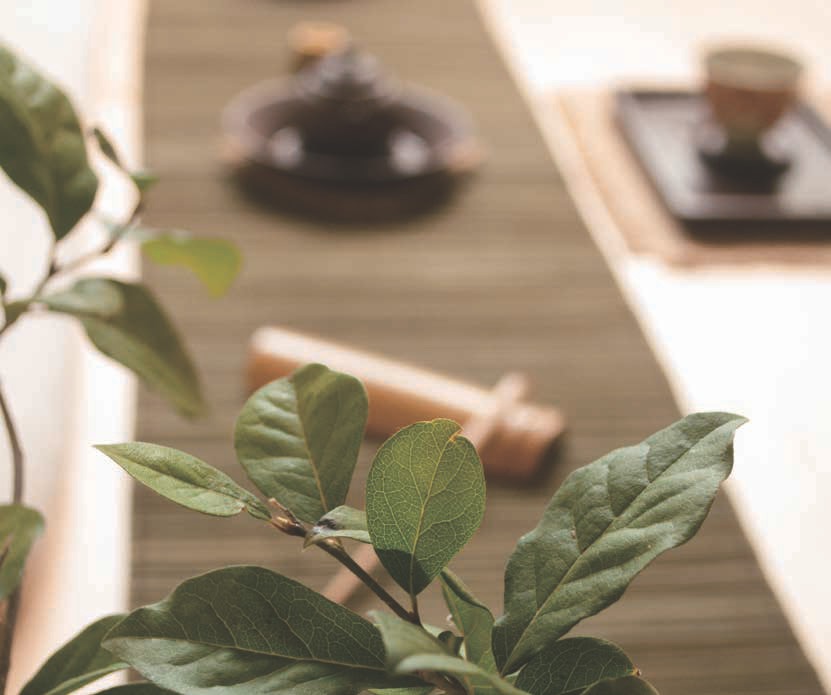
There is no point in trying to achieve a static state of fulfillment. It does not exist outside of this moment. Unfortunately, ever-lasting satisfaction will not be found in the attainment of that future vacation, that perfect spouse, house, car, job or that tidy garden. Such things will at best only temporarily satisfy us. There is no permanent plateau. Fulfillment is an earnest attitude towards what is happening right now. So, too, cleaning is a process, not a final state, and the attainment of cleanliness as a finished product is not to be sought after. Like life, cleanliness is a process - a continuous sweeping, both inside and out. To have the attitude that cleaning is done in order to achieve a final state of cleanliness is to face dissatisfaction again and again. To treat cleaning as a means to an end, in other words, as a task on your to-do list that will actually never be checked, not for very long at least, is to fail to be clean at all.
And so, we face the same conundrum: why clean? There is always work to be done and yet there is nothing to be done. If everything is clean on the absolute level and if it's just going to become unclean again tomorrow on the relative level, what difference does it make? Why are those monks sweeping in the graveyards? Surely if I understand this, so do they; and yet, there they are sweeping day in and day out...
There are Four Virtues of Tea. The first virtue is Harmony, the second, Reverence, and the third, Purity. The last is Tranquility. When we see something in harmony with Nature, and we ourselves are brought into harmony as a result, we develop a deep respect for that thing. We then purify that which we deeply respect. Cha Dao is eighty percent cleaning, which means we have a great respect for this tradition! So I clean my teaware, my tea space, and most importantly, my self.
One important way of showing respect in Asia is through hygiene. In part for this reason, we clean teaware in front of guests. They were already clean because we always leave time to clean up after every tea session, but like we said, cleaning is not a fixed state. So one practical reason for cleaning our teaware is to show a certain level of social respect. It also demonstrates a level of respect for ourselves as well. On a deeper level, however, cleansing the bowls at every tea ceremony is symbolic of sweeping away the dust of the world. In other words, removing all aspects of the self that separate us from others. At the tea table, we are of one family, you and I. Deeper still, in rinsing our teaware, we sweep away the remnants of any previous tea session, reminding us that this moment will occur but only once in our lives. I want my last tea session to be impeccably clean, every corner of the tearoom swept, every element of the chaxi perfectly placed, every impurity of the mind vanquished.
Every tea hour becomes a masterpiece, to serve as a distillation of all tea hours, as if it were the first and with no others to follow.
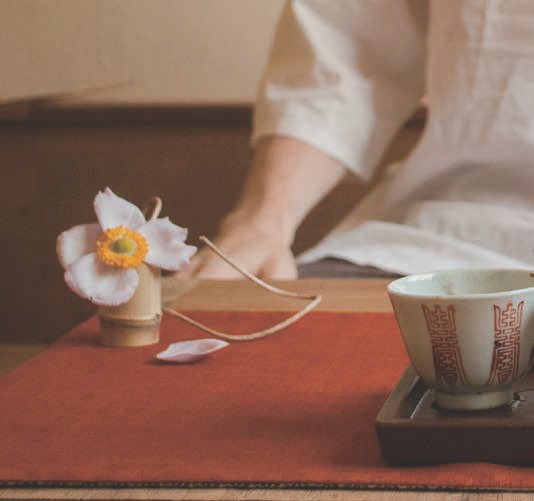
At our center, we clean everything and we do it often! So much so that I've heard countless guests remark how clean it feels as soon as they walk through the front door and into our main tea hall. They immediately feel calm, comfortable, and welcomed. Isn't that feeling true of your own home after a recent cleaning? Doesn't it feel somehow rejuvenated and inviting after a good spring cleaning? That sense of renewal is uplifting and energizing. That's the feeling we get at least once a week on our main cleaning day. The really beautiful thing is that what once felt like a chore is slowly but surely transforming into a joy. I look forward to cleaning at the center, and more and more appreciate how integral a role it plays in a life dedicated to Tea, shaping the atmosphere of every session. What once felt like something that had to be done in order to drink tea, is now becoming something that merges with the tea session itself, breaking down the boundaries of where the session begins and where cleaning ends. The cleaning is becoming as much the tea session as the session is itself, just as a really fine tea has no boundaries!
My teacher often says that it is the empty space that connects all elements at the tea table. For without that, where are we to brew and pour our tea? Should there be any impurities in the kettle, they would come through in the bowl. It is most important that we first empty ourselves because the one brewing is just as much a part of the tea making process as every other element. That is why we must open our heart and still our mind, for should any impurities reside in the heart, they will surely come through in the brew. It is through the heart that the mind connects to the hand. I have great respect for my body, through which I experience life. Consequently, I purify myself outwardly and inwardly. This is a great indicator for any person of Tea. As we purify ourselves, we make better tea. Better in flavor and aroma, but more importantly, better in our ability to serve tea that connects us with ourselves, with others, and with Nature.
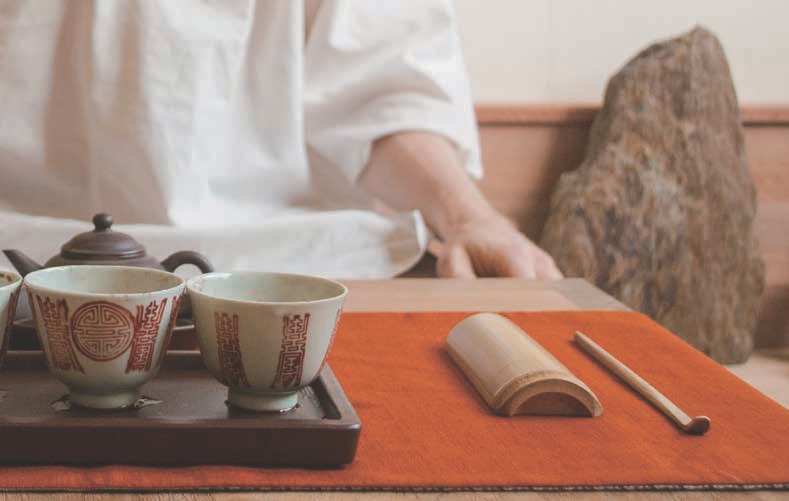
Those monks are sweeping because they understand through experience that there is no distinction between inner cleaning and outer cleaning, aside from a conceptual one. In the way that meditation purifies the mind, which our actions then stem from, so too does the outward act of cleaning our environment also have a way of cleansing us spiritually. As I purify my inner self through daily meditation, my external self in turn becomes cleaner. And as I cleanse my external self through daily acts of cleaning, my inner self in turn becomes more pure. Cleaning the internal environment of the mind and the external environment in which you live reflect each other proportionally. The cleanliness of one indicates the cleanliness of the other.
Like meditation, we clean for its own sake. Because there is cleaning to be done, we skillfully see it as a joyful process. A process that has no finished state, and one that ties in seamlessly to every other process. Purity is the act of cleaning; it is a labor of love. We clean before and after tea, and rest in the understanding that everything is in a state of return. We sweep diligently, even where no one will ever see (even under the proverbial rug!). We sweep to keep our environment clean, acknowledging that we are our environment. And also like meditation, we realize that purifying is not always an action. Like murky water, it settles on its own through inactivity. Whether we sweep the graveyard of the mind or the graveyard of the temple, we are always sweeping out of reverence and harmony.

Sweeping, silhouetted monks sitting tall with legs crossed. Diligently, like clouds over mountaintops, breath sweeps over mind, cleaning temple graveyards.